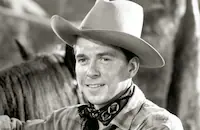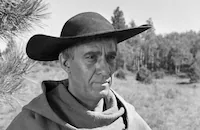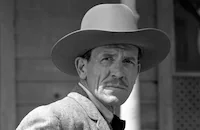Law and Order
Brief Synopsis
Cast & Crew
Nathan Juran
Ronald Reagan
Dorothy Malone
Preston Foster
Alex Nicol
Ruth Hampton
Film Details
Technical Specs

Synopsis
In 1882, sharp-shooting marshal Frame Johnson apprehends notorious outlaw The Durango Kid and brings him back to Tombstone, Arizona for a fair trial. The whole town, including Frame's two younger brothers, Luther and hotheaded Jimmy, heralds the two men's arrival. Although Frame and the law and order he has brought to Tombstone are widely respected, an angry mob quickly forms around the jail to lynch The Kid. Facing them alone, Frame threatens to shoot anyone who enters the jail, even after Jimmy steps to the head of the crowd. Later, Frame tells Jimmy that he is tired of giving people something they do not appreciate, and that they are leaving town. He then visits his girl friend Jeannie at her casino, and after he informs her that he has given up marshaling for a ranch in Cottonwood, she agrees to marry him. The Johnsons leave town with their friend, coroner Denver Cahoon, planning to send for Jeannie as soon as they are settled. When they arrive at the Cottonwood saloon the next evening, their entrance is noted by local rancher Kurt Durling, whose hand Frame shot off in a cattle-rustling raid. Durling, who now runs Cottonwood, vows revenge. Minutes later, Frame protects young Johnny Benton from the intimidation of Durling's son Bart. After Bart backs down, Durling slaps his son across the face for his cowardice. The next morning, Durling forces newspaper editor Martin to run a false editorial stating that Frame is a cold-blooded murderer posing as a lawman. Frame ignores it, but is drawn in when a mob gathers in the streets to lynch Johnny, who has killed Bart in self-defense. After Frame ensures that crooked sheriff Fin Elder will take Johnny to jail in the next town, a group headed by Judge Williams asks Frame to take over as sheriff and clean up the town, but Frame refuses. He and his brothers travel to the ranch but, seeing how much work it needs, return to town. On the way back, they find Johnny's body hanging from a tree. When the Johnsons confront Elder, he lies that he tried to protect Johnny, and calls Frame a coward for not trying to take over as sheriff. In response, Jimmy punches Elder and Lute volunteers to be sheriff. Frame congratulates Lute but leaves for the ranch with Denver and Jimmy. A few days later, Jimmy is on the outskirts of the ranch when he spots a beautiful girl and follows her home. Even after he realizes that she is Durling's daughter Maria, he declares his love for her. Meanwhile, Durling and his oldest son Frank trick Lute to keep him occupied while they rustle cattle. When Lute finally asks Frame for help, his older brother insists that he not return to his old life. That night, at the saloon, Frank and his henchman Jed shoot Lute. Frame and Jimmy rush to town, arriving just in time to hear Lute apologize for his failure before dying. Furious with both the Durlings and Frame, Jimmy drinks heavily and stalks off to kill Frank, but Denver knocks him out with a bottle to keep him from getting hurt. The next day, Frame announces that he is the new sheriff and that it is illegal to carry a gun in Cottonwood. Although everyone at first refuses, Frame arrests a few men and, when people see Judge Williams backing Frame legally, they comply. Back in Tombstone, Jeannie hears that Lute has died and immediately leaves for Cottonwood. There, she informs Frame that she no longer insists that he give up the law. Later that day, Denver, who has locked Jimmy in the jail, agrees to let him out, and Jimmy immediately grabs his gun. He races to Maria, but before they can flee together, Frank comes home, and trapped, Jimmy kills him. He and Maria rush to Frame's to tell him about the murder, and the sheriff forcibly locks Jimmy into the jail cell, promising him a fair trial. That night, however, Durling sends Jed to release Jimmy from jail, and, just as he has predicted, the next morning the townspeople assume that Frame has let his brother escape. Durling gathers a posse to chase Jimmy, but Frame demands to be the one to track his brother down. When Durling pulls out a gun he has hidden in his coat, an unarmed Frame fights back and the two struggle in the street. Suddenly, a stagecoach racing through the town square runs over Durling, after which Frame hops on a horse and takes off after Jimmy. Easily tracing Jimmy's drunken trail, Frame soon finds him in the hills. Jimmy pulls out a gun, but Frame climbs after him, urging him to turn himself in. At the top, Jimmy shoots Frame in the shoulder, but when his brother collapses, races to his side to rescue him. Judge Williams is trying to dissuade the men from going after Jimmy when Frame and Jimmy return together. Sure that no jury will convict a man who has returned of his own will, Jed and his men flee town. As Maria embraces Jimmy, Frame promises Jeannie that now he is truly through with the law.

Director
Nathan Juran
Cast

Ronald Reagan

Dorothy Malone

Preston Foster

Alex Nicol
Ruth Hampton

Russell Johnson
Barry Kelley
Chubby Johnson

Jack Kelly

Dennis Weaver

Wally Cassell
Richard Garrick
Valerie Jackson
Don Garner
Tom Browne Henry
Tristram Coffin

Gregg Barton
William O'neal
Bill Tannen
Jack Daly
James Stone
Harry Harvey

Martin Garralaga
Mike Ragan
Lane Bradford

Ken Macdonald
Britt Wood
Helen Noyes
Sam Flint
Wheaton Chambers

Don Gordon
Lorin Raker
Dick Cutting
Chuck Hamilton
Phil Chambers
Watson Downs
Roy Butler
Thor Holmes
Kermit Maynard
Stanley Blystone
Garry Epper
William Gould
Ted Jordan
Jack Ingram
Edwin Parker
Ethan Laidlaw
Tom Hubbard
Jimmy Gray
Harte Wayne
John Carpenter
Jack Harden
Philo Mccullough
Frank Cordell
Jack Stoney
Buddy Roosevelt
Carl Andre
Boyd "red" Morgan
Victor Homito
Crew
John Austin
Gwen Bagni
John Bagni
D. D. Beauchamp
Irvin Berwick
Leslie I. Carey
Robert Clatworthy
Inez Cocke
Harry Davis
Fred Frank
William Fritzsche
Russell A. Gausman
Joseph Gershenson
Alexander Golitzen
Sid Gottleib
Ted J. Kent
Gordon Mclean
Rosemary Odell
Robert Pritchard
John W. Rogers
Joan St. Oegger
Clifford Stine
Lou Swartz
Tommy Thompson
Bud Westmore
Harry Wolfe

Film Details
Technical Specs

Articles
Ronald Reagan, 1911-2004 - TCM Remembers Ronald Reagan
Ronald Reagan, the actor turned elected official whose fascinating career saw him develop as a contract player for Warner Brothers studios, to a politician who fulfilled his ambitions by becoming the 40th President of the United States, died at his home in Los Angeles on June 5 after a long battle with Alzheimer's disease. He was 93.
He was born Ronald Wilson Reagan on February 6, 1911 in Tampico, Illinois to John and Nelle Reagan. When Reagan was nine, his family settled down in the small community of Dixon, about 100 miles west of Chicago. After high school, Reagan enrolled in Eureka College, a small Christian school near Peoria. He graduated in 1932 with a degree in Economics, and pursued a career in broadcasting. His first gig was as a part-time announcer at WOC in Davenport, Iowa. Within a year, WOC had merged with its big-sister station, WHO in Des Moines, and Reagan was hired as a sports announcer.
In the spring of 1937, Reagan drove to Southern California to catch the Chicago Cubs in spring training on Santa Catalina Island. While he was in California, he wrangled a screen test and signed a contract for $200 a week with Warner Brothers. His film debut was rather inauspicious; he portrayed a radio announcer in an innocuous comedy Love is on the Air (1937). He made a few more "B" programmers like Hollywood Hotel (also 1937), and Girls on Probation (1938), before getting his first prominent role opposite Bette Davis in the popular tearjerker, Dark Victory (1939).
Although he seldom got credit for being a good actor, there was no denying that Reagan held his own given the right material: Knute Rockne, All American as the doomed Notre Dame football hero George "The Gipper" Gipp, where he delivered the film's immortal line "Win one for the Gipper!"; Santa Fe Trail in which he ably supports Errol Flynn in one of the boxoffice hits of its era (both 1940); Kings Row (1941), featuring one of his finest performances as a small-town playboy whose legs are amputated by a careless surgeon; and Desperate Journey (1942) where he again supported Flynn in an exciting action picture.
Due to his poor eyesight, Reagan didn't see any action in World War II, so the studio heads assigned him to star in a series of patriotic films produced by the First Motion Picture Unit of the Army Air Forces in Culver City. Between 1942-45, Reagan starred in over 400 of these films. After the war, Reagan still found some good roles: The Voice of the Turtle (1947) proved he had a deft hand at light comedy opposite Eleanor Parker; The Hasty Heart (1949) offered another underrated performance as he ably portrayed the Yank in John Patrick's much heralded wartime play; and Storm Warning (1950) was a slick melodrama that cast Reagan as a crusading District Attorney determined to bring the KKK in a small southern town, with the help of Doris Day and Ginger Rogers!
It was around this time that Reagan became involved in politics. In 1947, he began a five-year term as president of the Screen Actors Guild (SAG), and testified in October of that year before the newly formed House Un-American Activities Committee (HUAC). He identified suspected Communists Larry Parks, Howard Da Silva and Alexander Knox, all of whom were subsequently called to testify, and subsequently blacklisted. Later records showed Reagan was so concerned about the Communist influence in Hollywood, that he became an FBI informer.
As Reagan became steeped in his political career, his parts throughout the '50s became inferior: the notorious Bedtime for Bonzo (1951); the coy "sex" comedy She's Working Her Way Through College (1952) that cast him as a college professor who romances a stripper! (Virginia Mayo); Cattle Queen of Montana (1955), a sluggish Western that even the redoubtable Barbara Stanwyck couldn't save; and finally Hellcats of the Navy (1957), a stodgy war picture that would be his only film that co-starred his wife Nancy (Davis).
Television offered some salvation. For eight years, (1954-62), Reagan served as the host of General Electric Theater, a televised series of dramas. He also found a niche as GE's goodwill ambassador to employees and to civic and business groups around the country, furthering his taste and honing his craft as a public official. By the mid '60s, Reagan would move into politics entirely, save for one last film, the thrilling The Killers (1964), Reagan's only known villainous role, as a murderous gangster. That same year, he actively campaigned for Republican Presidential candidate Barry Goldwater, although Goldwater lost to Lyndon B. Johnson.
Reagan whose profile was riding high, had cemented his future as a successful politician. In 1966, he ran against incumbent Governor Pat Brown for the state of California and won, serving successfully for two terms until 1974.
Reagan began an all-out, two-year drive to wrest the 1976 nomination from incumbent Gerald R. Ford, an appointed vice president who became president on the resignation of Nixon. Reagan fell short by a handful of delegates to the Republican national convention. But Ford lost to Jimmy Carter, and Reagan became the front-runner to challenge Carter in 1980. After defeating Carter, Reagan held two terms as President of the United States (1981-89). After his second term was over, he retired quietly in California. In 1994, it was revealed to the media that Reagan was suffering from Alzheimer's disease; he had been kept out of the public eye since then.
He was married briefly to actress Jane Wyman (1940-48), and had two children; a daughter Maureen and an adopted son, Michael. In 1952, he married a budding film starlet, Nancy Davis, who bore him two more children; a daughter, Patty; and a son, Ronald Jr. Ronald Reagan is survived by Nancy, Michael, Patty and Ron Jr. His daughter Maureen died of Melanoma in 2001 at the age of 60.
by Michael T. Toole

Ronald Reagan, 1911-2004 - TCM Remembers Ronald Reagan
Quotes
Why didn't you shoot me when you had the chance?- Durango Kid
I'm hired to keep the peace, not kill people.- Frame Johnson
Seems like the two of them sort of go hand in hand.- Durango Kid
At least you got the satisfaction of knowin' you'll get hung legal.- Frame Johnson
That might be some satisfaction to you. But I can't help thinkin' you wind up dead either way.- Durango Kid
You're big and you're ugly and you're stupid, and I happen to be in love with you.- Jeannie
Where's the Durango Kid?- Denver Cahoon
That's him.- Frame Johnson
You mean to say you brought him back alive?- Denver Cahoon
Well, for the time being.- Frame Johnson
Now, we've been friends for a long time, Frame. But since you cleaned up this town, I can't hardly make a living. How do you expect me to make any money off of him?- Denver Cahoon
Don't worry about it friend, you won't have to wait long.- Durango Kid
Trivia
Notes
In the film's opening credits, the screenwriters are listed as "John and Gwen Bagni." According to a September 1952 Hollywood Reporter news item, Susan Cabot was originally cast as "Maria Durling," but dental surgery caused her to be replaced by Ruth Hampton. Although a Hollywood Reporter news item adds Clayton Moore to the cast, he was not in the released film. Universal made two earlier adaptations of William R. Burnett's book, Saint Johnson, both entitled Law and Order. The 1932 version was directed by Tom Reed, adapted by John Huston and starred Walter Huston; the 1940 film was directed by Ray Taylor and starred Johnny Mack Brown (see AFI Catalog of Feature Films, 1931-40).

Miscellaneous Notes
Released in United States on Video May 14, 1996
Released in United States Spring April 1953
Released in United States Spring April 1953
Released in United States on Video May 14, 1996













